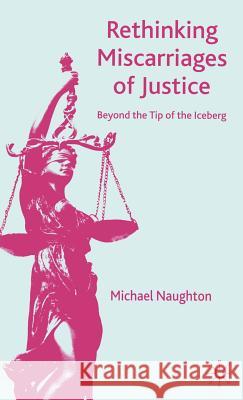Rethinking Miscarriages of Justice: Beyond the Tip of the Iceberg » książka
topmenu
Rethinking Miscarriages of Justice: Beyond the Tip of the Iceberg
ISBN-13: 9780230019065 / Angielski / Twarda / 2007 / 233 str.
Rethinking Miscarriages of Justice: Beyond the Tip of the Iceberg
ISBN-13: 9780230019065 / Angielski / Twarda / 2007 / 233 str.
cena 201,24
(netto: 191,66 VAT: 5%)
Najniższa cena z 30 dni: 192,74
(netto: 191,66 VAT: 5%)
Najniższa cena z 30 dni: 192,74
Termin realizacji zamówienia:
ok. 22 dni roboczych
Dostawa w 2026 r.
ok. 22 dni roboczych
Dostawa w 2026 r.
Darmowa dostawa!
This book answers the question: what precisely constitutes a miscarriage of justice in England and Wales?











